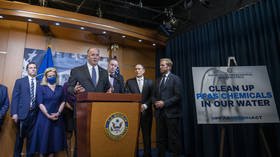Better late than never? House passes bill against ‘forever chemicals’ in foot-dragging spectacle, after just ONE state enacts ban

The House of Representatives has passed a bill to ban PFAS – so-called “forever chemicals” that make products stain- and water-resistant – unless their use is deemed “unavoidable.” Maine has banned the toxic substances from 2030.
“This overdue legislation will save lives,” Rep. Lori Trahan (D-Massachusetts), a member of the House Energy and Commerce Committee, declared on Wednesday. In addition to cleaning up existing PFAS contamination, the law would both help people who have suffered exposure to the deadly chemicals and avoid future exposure.
I just voted for the PFAS Action Act of 2021, long overdue legislation that will save lives in #MA3 & across our country. I spoke on the House floor earlier today about why we need to make it law NOW. pic.twitter.com/xeRacSjnTT
— Congresswoman Lori Trahan (@RepLoriTrahan) July 21, 2021
However, the nationwide version of the bill hasn’t quite become law, and requires President Joe Biden’s signature before it can take effect. Biden, who has promised to crack down on PFAS by designating them “hazardous substances,” announced that $75 million would be set aside in the 2022 budget to study forever chemicals and address the issues that come with decontamination.
The chemicals are already known to be associated with illnesses such as kidney cancer, immunological problems, and thyroid hormone issues, and have been removed from food packaging and other uses where they are likely to be accidentally ingested, but the companies that make them – 3M, DuPont, and other big-time political donors – have derailed previous presidents’ efforts to get tough on the polluters. It’s not clear whether the president – who infamously promised the donor establishment that “nothing will fundamentally change” under his presidency – is willing to risk the support of Big Chemical.
Also on rt.com Biden’s backing for waiving Covid vaccine patents is a great step, but there are some big reasons why it won’t be a gamechangerTrahan’s office also hopes to clean up constituents’ water, announcing plans for a 10,500 square-foot (975 square-meter) water treatment plant designed to filter PFAS out of contaminated wells. However, her efforts to get a similar measure passed in the Senate have not yet borne fruit, and some 200 million Americans are currently drinking PFAS in their own water – a testament to how difficult it is to remove the chemical from water supplies once it infiltrates them.
However, some progress is being made, if infinitesimal. Similar legislation passed in the state of Maine last week, though locals complained it wouldn’t take effect until 2030, leaving residents to effectively poison themselves in the meantime should they fail to keep an eye out for products labeled “non-stick, stain-resistant” and so on. The forever chemicals are already pervasive in the drinking water of some 2,000 communities across the US, including 50 public water sources in Massachusetts alone – and that’s just reports from this year. Starting in 2023, companies that manufacture such products must notify the state as well.
In Wisconsin, PFAS chemicals have been found in the drinking water of over 50 cities. I joined my colleagues on the PFAS Task Force this morning to highlight the need to pass the PFAS Action Act to get these toxic chemicals out of our water. We must act now. pic.twitter.com/f6TSOupEPj
— Rep. Mark Pocan (@repmarkpocan) July 21, 2021
The Maine law – the first of its kind – was hailed as “a national model for policymakers to eliminate all but the ‘essential’ uses of PFAS in products,” with the loophole usable for “critical products such as medical devices” and fire-fighting foam, according to environmental health group Defend Our Health. The products have been the target of several lawsuits in recent years, including a $671 million settlement with DuPont and Chemours regarding a perfluorooctanoic acid (a PFAS chemical) leak in 2017.
The toxic nature of PFAS and their sister chemicals has not exactly been a secret all these years. Polyfluoroalkyl and perfluoroalkyl substances are all but impossible to remove from the body, hence the term “forever chemicals.” The Environmental Protection Agency is also seeking to step up the timetable regarding regulation and removal of these chemicals from drinking water, as once the substances enter the body, they are essentially impossible to extricate.

The 9,000 chemicals in question do not break down naturally, instead accumulating in the environment throughout the food chain. While it might seem shocking that Maine was the first state to ban them, their ubiquity has presented something of a brick wall to those seeking a place to start with regard to removal. Getting other states on board also represents a major challenge.
Message to @NYGovCuomo from @RocklandWater, @foodandwater, and dozens of businesses, faith institutions, and civic groups: Do your job to protect the safety of our water from toxic PFAS chemicals! pic.twitter.com/7Pj6DnutHi
— Eric Weltman (@EricWeltman) July 22, 2021
Advocacy organization Environmental Working Group has been bringing public attention to PFAS since only the mid-2000s, meaning the cleanup effort is impossibly far behind, given the rapidity at which these toxins are generated, and the rate at which they poured into public consumption starting with the ‘Better Living Through Chemistry’ post-WW2 era. However, the additional $26 million the EPA would receive under Biden’s budgetary request made in April would be a much-welcome sum compared to the $49 million the agency received to combat the toxic substances this past year.
PFAS chemicals are an urgent threat to public health. With the passage of my #PFASAction Act today, we are one step closer to protecting the health of Americans and our environment from these toxic forever chemicals. pic.twitter.com/R9yAn48fSc
— Rep. Debbie Dingell (@RepDebDingell) July 21, 2021
But Defend Our Health noted the time for studying “forever chemicals” had come and gone. “We’re well past the time of needing more research in order to declare PFAS as a class of hazardous substances, or to establish a truly health protective [maximum contaminant level] for drinking water,” deputy director Patrick MacRoy told Bloomberg earlier this year, adding that PFAS contamination had already forced the shutdown of multiple farms in Maine.
We could easily spend $75 million in Maine alone and still not ‘tackle’ PFAS pollution.
While 3M has tacitly admitted PFAS might not be the best substances for humans to be ingesting, noting “the science of PFAS continues to evolve,” the company insists “the weight of scientific evidence does not show PFOA or PFOS cause harm in people at current or past levels found in the environment.” Both are types of PFAS. Along with other companies, including DuPont, it recently settled a $4 billion lawsuit over the chemicals.
Also on rt.com Johnson & Johnson and other leading US drug distributors agree to $26bn settlement with states over their role in opioid epidemicThink your friends would be interested? Share this story!













